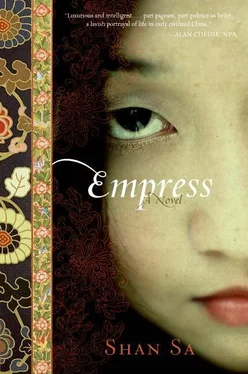Shan Sa - Empress
Здесь есть возможность читать онлайн «Shan Sa - Empress» весь текст электронной книги совершенно бесплатно (целиком полную версию без сокращений). В некоторых случаях можно слушать аудио, скачать через торрент в формате fb2 и присутствует краткое содержание. Жанр: Историческая проза, на английском языке. Описание произведения, (предисловие) а так же отзывы посетителей доступны на портале библиотеки ЛибКат.
- Название:Empress
- Автор:
- Жанр:
- Год:неизвестен
- ISBN:нет данных
- Рейтинг книги:5 / 5. Голосов: 1
-
Избранное:Добавить в избранное
- Отзывы:
-
Ваша оценка:
- 100
- 1
- 2
- 3
- 4
- 5
Empress: краткое содержание, описание и аннотация
Предлагаем к чтению аннотацию, описание, краткое содержание или предисловие (зависит от того, что написал сам автор книги «Empress»). Если вы не нашли необходимую информацию о книге — напишите в комментариях, мы постараемся отыскать её.
Empress — читать онлайн бесплатно полную книгу (весь текст) целиком
Ниже представлен текст книги, разбитый по страницам. Система сохранения места последней прочитанной страницы, позволяет с удобством читать онлайн бесплатно книгу «Empress», без необходимости каждый раз заново искать на чём Вы остановились. Поставьте закладку, и сможете в любой момент перейти на страницу, на которой закончили чтение.
Интервал:
Закладка:
During his reign, the Emperor Eternal Ancestor had intended to make this sacred pilgrimage, but the fragile state of his convalescing empire had forced him to abandon the plan. I begged my husband to carry out this unfulfilled wish. The ancients said that Tai was the sovereign of all mountains, that at its summit a door opened into the celestial world. I dreamed of grasping the mysterious power of mountains: As they reared up impetuously, the earth joined the sky.
My enthusiasm could not sweep aside Little Phoenix’s scruples; like every son crushed by the weight of a daunting inheritance, he was wracked with despondency and doubt when he had to surpass himself. He said that his crown had fallen to him by accident, and, as a simple mortal and a humble servant of the Empire, he wondered: Was he invested with the Celestial Will, was he worthy of being the one and only initiated person on Earth, was he the sublime sacrifice that the people made to the gods, and was he the Savior of the World? Up there in the mists and the eternal wind, would he not be dizzied by his own ascension and his solitude?
My eyes filled with tears.
“Yes, Majesty, you are this providential son. You have been chosen by the gods to incarnate goodness and generosity; you are the sovereign who will drive out poverty and suffering on Earth!”
The Emperor wept too. He was haunted by a painful childhood deprived of a mother’s love and a distressing adolescence shattered by scheming and fratricide. He could not free himself from the demons coiled within his heart and chose to huddle in the shadows of the Forbidden City.
Two years later, the Palace servants found the footprint of a griffon on the imperial steps to the Pavilion of Perfection. The Ancient Books described this sacred animal’s appearance on Earth as a harbinger of victory and peace. I saw this extraordinary event as a divine sign: I had to bear my husband up to the highest point in life, to the pinnacle of humanity.
The news sent a thrill of excitement through Court officials. I secretly encouraged learned courtiers to send petitions to the sovereign calling for him to climb Tai Mountain. Soon provincial governors, district administrators, chiefs of southern tribes, and western kings joined in unison to make the same request. The sovereign could not decline the invitation of the heavens or his people’s request. He was persuaded.
IN THE THIRD month of the fourth year of the Virtue of the Griffon, the Emperor transferred his Court to the eastern capital and arranged to set out with foreign kings and tribal chiefs from the world over. My august husband conducted an extraordinary deliberation during which ministers and scholars used the annals and the books of doctrine to establish the protocol for the ceremonies. They chose sacred melodies and dances and agreed on the list of participants and officiators. I planned the construction of the imperial route and the erection of altars; I renewed the armies’ ceremonial uniforms and took measures to prevent skirmishes along our borders and avoid a possible coup in the capital during the Emperor’s absence.
The ritual for the petition began in the tenth month. During a solemn audience the Supreme Son, the kings and great lords, followed by the Great Ministers, magistrates, advisers, Governor Delegates and foreign princes, all presented their official requests to the sovereign, asking him to make the ascent of the sacred mountain. After refusing three times to demonstrate his humility, my husband announced to the world that he had decided to undertake the pilgrimage. I immediately sent my congratulations to the sovereign, along with a letter in which I disputed the ancestral law that banned all women from the ritual ceremonies. I demanded the right to be the second officiator for the Sacrifice to the Earth.
“According to the rules of the Rites, two ministers will assist the sovereign during the Libation to the Earth. Man is the incarnation of the celestial breath and woman represents earthly powers. Eternity is the product of the transmutation born of the union between Heaven and Earth. How can it be that women should be excluded from the sacrifice which pays homage to her original element? During the ceremony, the shades of every empress will be invoked in prayers for fertility. Is it conceivable that the spirits of these august deceased should appear before strangers, all of them men? Without their honorable presence, the ritual would be incomplete, and no blessing would be granted. It is true that, in China ’s history, no woman has ever been admitted to the supreme Service of the Empire. Should we persist with a shortcoming of the Ancients to the detriment of the future?”
When my letter was read in public during the morning audience, it shocked the Court. I saw amazement and consternation on our ministers’ faces, but the sovereign found my arguments irrefutable: He expressed his approval, and the debate was closed. I would be the first woman to discover the mysteries of these celebrations.
On the twenty-eighth day of the tenth month, there was a chill northern wind, and the coral-colored sun hung in a crystal clear sky. Luoyang was deserted: The main avenue was covered in wet sand, and it gleamed like a golden sword laid down by the gods.
Men in yellow brocade marched slowly from the Southern Gate of the Forbidden City. They held signs with the words “Make way, keep clear” written on them in powdered gold, and they shouted to announce the beginning of the imperial procession.
There was a succession of parades for different dignitaries: first the Administrator from the district of Ten Thousand Years, the Governor of Long Peace, the Great Lord Overseer, and the Minister for Armies; then the Great Generals of the Golden Scepter of the Right and the Left. Both wore purple brocade, black breastplates with red lacing, and gold-plated helmets; they were mounted on horses with plaited manes and tails. They each carried a quiver of twenty-two arrows on their backs, and sabers hung from their leather belts in sheaths inlaid with precious stones. Behind them came an escort of four horsemen holding the lance adorned with yak hair as a symbol of victory.
Two lieutenants of the Golden Scepter headed up a square formation of forty-eight soldiers with scarves wound around their topknots, bronze breastplates, crimson trousers, quivers on their backs, and sabers on their belts. They were accompanied by twenty-four armored foot soldiers.
A group of standard bearers held their banners aloft in the wind, displaying the Crimson Bird, the god of the south.
Then came the procession of six carriages with roadmen marching before them. Each carriage was drawn by four horses and carried fourteen coachmen. The first measured the distance; the second established the direction; the third was decorated with white cranes; the fourth bore the flag of the phoenix; the fifth transported the Great Seer and dispelled evil; the sixth was driven by a soldier of the Golden Scepter armed with a crossbow and was covered in wild animal skins.
Then came two lieutenants of the Golden Scepter and their twelve mounted lancers and archers.
Next came the troop of imperial musicians: twelve drums, twelve golden kettledrums, 120 large drums, and 120 long horns. Small drums, a choir, pipes, and Tatar flutes were lined up in groups of twelve, while 112 flautists with larger flutes marched ahead of the two drums setting the rhythm. Then came the bamboo flutes, pipes, mouth organs, more Tatar flutes, and mouth organs made of peach wood. Then there were another twelve drums, twelve golden kettledrums, 112 small tambourines, and 112 bugles. Twelve more drums decorated with feathers headed up a square formation comprising a choir, pipes, and Tatar flutes. All of them began to play the solemn melody of the Emperor’s Departure.
Читать дальшеИнтервал:
Закладка:
Похожие книги на «Empress»
Представляем Вашему вниманию похожие книги на «Empress» списком для выбора. Мы отобрали схожую по названию и смыслу литературу в надежде предоставить читателям больше вариантов отыскать новые, интересные, ещё непрочитанные произведения.
Обсуждение, отзывы о книге «Empress» и просто собственные мнения читателей. Оставьте ваши комментарии, напишите, что Вы думаете о произведении, его смысле или главных героях. Укажите что конкретно понравилось, а что нет, и почему Вы так считаете.





